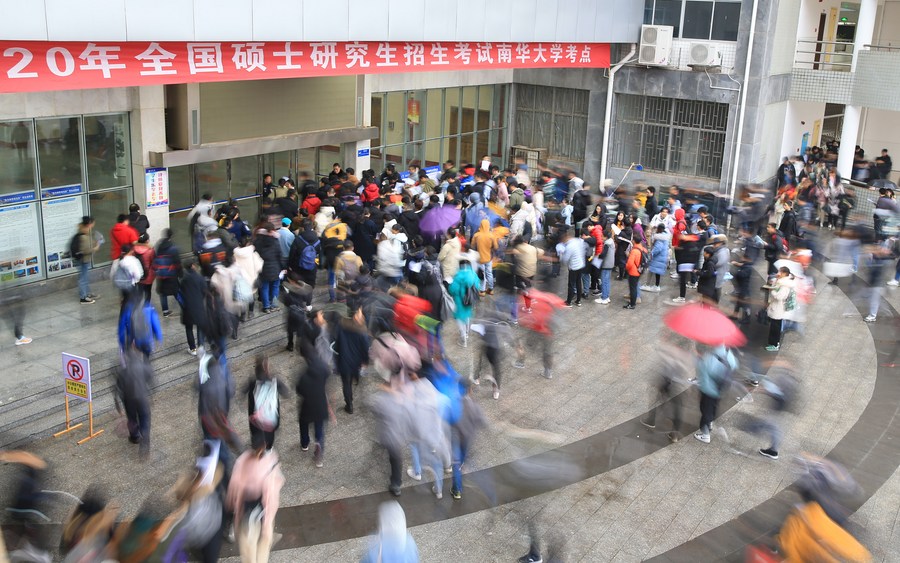


Candidates prepare to sit the national postgraduate entrance exam at University of South China in Hengyang, central China's Hunan Province, Dec. 21, 2019. (Photo by Cao Zhengping/Xinhua)
A record 3.77 million people are expected to take part in China's 2021 national entrance exam for postgraduate studies from Saturday to Monday, 360,000 more than last year, according to the Ministry of Education.
That marks a year-on-year increase of 10.6 percent. The number has increased steadily over the past several years from 2.01 million in 2017 to 2.38 million in 2018, 2.9 million in 2019 and 3.41 million this year, ministry said.
While there has been significant increase in applicants, the increase in enrollment has been slower. Last year, 811,000 examinees were enrolled in postgraduate studies, up from 762,000 in 2018 and 722,000 in 2017, according to the ministry.
The mismatch in growth rates of applicants and enrollees has made the exam increasingly competitive. The overall student enrollment rate has dropped from 36 percent in 2017 to 32 percent in 2018 and 28 percent last year.
On Thursday night, the ministry also asked local educational authorities to conduct the strictest epidemic prevention and control measures to ensure the safety of examinees and test supervisors.
Test-takers in high-or medium-risk areas and those with symptoms of illness who are placed in isolation rooms should wear masks throughout the exam, while participants in low-risk areas should wear masks before they enter the test rooms, the ministry said.
All exam centers and test papers should be thoroughly disinfected and test supervisors should instruct participants about keeping a proper distance from each other, it said.
With a record 9.09 million university students expected to graduate next year, a survey by education website eol.cn published recently found that growing competition in the job market was among the top reasons for the increase in applicants.
When asked about the reasons they wanted to pursue a master's degree, 52 percent of respondents said it would improve their overall capability, 51.3 percent said it would boost their competitiveness in the job market and 50 percent said they wanted to study at a better university.
Less than 20 percent said they wanted to pursue postgraduate studies for academic research and 2 percent said they had given up plans to study overseas in favor of domestic universities due to the COVID-19 pandemic, the survey said.
The survey also found that an increasing number of students who take the exam have started working but are unsatisfactory with their jobs. They want to obtain a higher degree as a way to better employment options, it said.
A total of 15,410 people who applied to Yunnan University this year had graduated in previous years, accounting for 63 percent of the total applicants, up by 7 percentage points from last year. Almost 8,400 people or 62 percent of the total who applied to Northwest Normal University in Lanzhou, Gansu province, are not new graduates, up by 5 percentage points from last year.
Ma Kanghui, a senior from North China Institute of Aerospace Engineering in Langfang, Hebei province, said he had decided to take the exam two years ago because he considered a bachelor's degree inadequate for finding a good job.
More than 70 percent of his classmates have signed up for the exam because a master's degree has become the entry requirement for many good jobs, the 21-year-old said.
Wu Dongcheng, 20, a senior from Henan Agricultural University, said preparation for the postgraduate entrance exam has been more difficult than the notoriously competitive national college entrance exam, or gaokao.
"For the gaokao, you have the teachers' guidance all the way and the entire class beside you, but for postgraduate exam, you are fighting your own battle as different people take different exams based on the university and major chosen," he said.
Both Ma and Wu said they are prepared to take the exam again if the results are not satisfactory because they consider it an opportunity for a better future.

 Award-winning photos show poverty reduction achievements in NE China's Jilin province
Award-winning photos show poverty reduction achievements in NE China's Jilin province People dance to greet advent of New Year in Ameiqituo Town, Guizhou
People dance to greet advent of New Year in Ameiqituo Town, Guizhou Fire brigade in Shanghai holds group wedding
Fire brigade in Shanghai holds group wedding Tourists enjoy ice sculptures in Datan Town, north China
Tourists enjoy ice sculptures in Datan Town, north China Sunset scenery of Dayan Pagoda in Xi'an
Sunset scenery of Dayan Pagoda in Xi'an Tourists have fun at scenic spot in Nanlong Town, NW China
Tourists have fun at scenic spot in Nanlong Town, NW China Harbin attracts tourists by making best use of ice in winter
Harbin attracts tourists by making best use of ice in winter In pics: FIS Alpine Ski Women's World Cup Slalom
In pics: FIS Alpine Ski Women's World Cup Slalom Black-necked cranes rest at reservoir in Lhunzhub County, Lhasa
Black-necked cranes rest at reservoir in Lhunzhub County, Lhasa China's FAST telescope will be available to foreign scientists in April
China's FAST telescope will be available to foreign scientists in April